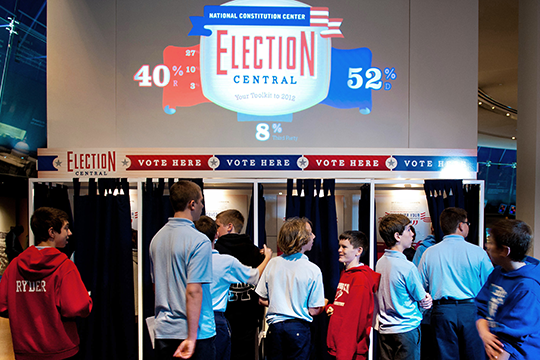
Constitution 101 Course
Start your constitutional learning journey

Constitution 101 With Khan Academy
Explore our new course that empowers students to learn the Constitution at their own pace.

Dive into learning about the electoral process, the executive branch, and the Constitution as you follow the 2024 presidential election. Our free, nonpartisan classroom resources, primary source documents, short videos, virtual events, and exhibit explorations are available to craft relevant lesson plans for students and engage learners of all ages.
Explore foundations of the electoral process in our Interactive Constitution, a nonpartisan tool that allows learners of all ages to engage with the text of the Constitution.
Article II establishes the executive branch of the federal government and outlines the powers and duties of the president.
Learn MoreThe 12th Amendment establishes the process for electing the president and vice president.
Learn MoreArticle 1, Section 4, establishes guidelines for congressional elections and meetings.
Learn MoreOur library of educational resources for classrooms offers everything educators need to craft relevant lesson plans—view videos from our Constitution 101 teacher-led curriculum or our student-led course in partnership with Khan Academy, explore primary source documents, and find engaging activities.


Your classroom can join us live or on demand, as your schedule fits, to make election connections with our exhibits. We are offering Scholar Exchanges focusing on the topic of the Electoral College through November!

Tuesday, October 29 | Noon ET
Students can join us live as we highlight all of the Election Connections from our main exhibit, The Story of We the People. We’ll explore Article II of the Constitution and look at the history of voting rights and how people have cast their ballots.

This virtual tour explores questions like: Does the Constitution protect the right to vote? What is the basic constitutional framework for elections in the United States? What role did the amendment process play in shaping voting rights? Explore the ins and outs of elections and voting with live classes and virtual exhibit tours.
Learn More
The Honorable J. Michael Luttig, formerly of the U.S. Court of Appeals for the Fourth Circuit, recounts a story of his historic tweet that contributed to Vice President Mike Pence’s decision to certify the results of the 2020 election, along with his reflections on how to prevent another January 6. He’s joined by three experts—Ned Foley of The Ohio State University, Sarah Isgur of The Dispatch, and Clark Neily of the Cato Institute—who are each leading a team on a bipartisan project for the National Constitution Center, Restoring the Guardrails of Democracy. They discuss other potential reforms including whether changes should be made to the Electoral Count Act and preview their forthcoming reports for the project. Together, our panelists consider ways to strengthen American constitutional and democratic institutions against current and future threats. Jeffrey Rosen, president and CEO of the National Constitution Center, moderates.
Learn More
Michael Gerhardt, author of the new book FDR’s Mentors: Navigating the Path to Greatness, and Andrew Busch, author of Reagan's Victory: The Presidential Election of 1980 and the Rise of the Right, explore the pivotal elections of 1932 and 1980. They compare the transformative presidencies of Franklin D. Roosevelt and Ronald Reagan, and trace how founding-era debates between Hamilton and Jefferson over the scope of federal and executive power re-emerged during the New Deal and Reagan Revolution.
Learn MoreUse these blog posts to craft answers to questions on post-election processes established by the Constitution and its amendments that may arise on or after Election Day. These resources can be used as deep dives on historical events or discussion starters about modern debates:

Explore our new 15-unit core curriculum with educational videos, primary texts, and more.

Search and browse videos, podcasts, and blog posts on constitutional topics.

Discover primary texts and historical documents that span American history and have shaped the American constitutional tradition.